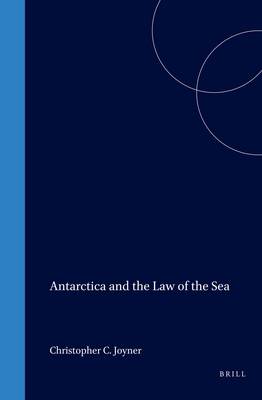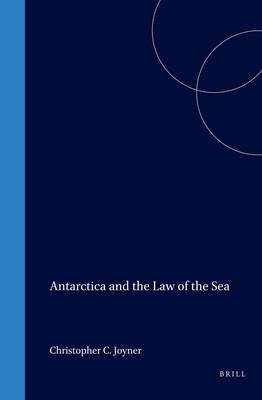
Je cadeautjes zeker op tijd in huis hebben voor de feestdagen? Kom langs in onze winkels en vind het perfecte geschenk!
- Afhalen na 1 uur in een winkel met voorraad
- Gratis thuislevering in België vanaf € 30
- Ruim aanbod met 7 miljoen producten
Je cadeautjes zeker op tijd in huis hebben voor de feestdagen? Kom langs in onze winkels en vind het perfecte geschenk!
- Afhalen na 1 uur in een winkel met voorraad
- Gratis thuislevering in België vanaf € 30
- Ruim aanbod met 7 miljoen producten
Zoeken
Omschrijving
Antarctica and the Southern Ocean cover one-tenth of the earth's surface. In a legal and environmental sense, Antarctica represents the geography of hope. It is the freshest and most pristine of regions, governed by a legal regime that offers Antarctica and its circumpolar water the unique possibility of becoming the world's first global wilderness preserve.
But in today's age of resource scarcity, Antarctica still provokes much political, economic and legal debate. Over the past decade, international attention has increasingly focused on the legal status of the continent, the potential for hydrocarbon exploitation offshore, and opportunities for harvesting circumpolar living marine resources. In this fascinating treatment, Christopher C. Joyner undertakes the first serious examination of the intimate relationship between Antarctica and the law of the sea. Using Antarctica as a case study, Joyner probes large conceptual issues of ocean law and politics. He uses the intricate details of oceanography and law to unravel the dynamics of the Antarctic Treaty System. In doing so, he examines how the changing importance of Antarctic issues has affected the development of the law of the sea for the region, the ways in which states define their national interests, and the accommodation through various negotations that have contributed to the development of law for governing the Southern Ocean.
While the study of law for the Antarctic is provocative in itself, this work goes much farther. The study critically analyzes the region's biogeography, the condition of sovereignty on the continent, the lawfulness of asserting jurisdictional zones offshore, and various legal implications for Antarctica's continental shelf, local island groups, circumpolar deep seabed, and the Southern Ocean's high seas. Moreover, the special legal efforts by the international community to protect the Antarctic seas from marine pollution and to conserve its living marine resources are comprehensively appraised.
Thorough, authoritative, and objectively reasoned, Antarctica and the Law of the Sea provides an insightful assessment of how law can progressively develop for a resource-rich region of the world's ocean. As such, it should appeal to a broad range of international lawyers and social scientists who are interested in international relations, political economy, environmental politics, and the law of the sea.
But in today's age of resource scarcity, Antarctica still provokes much political, economic and legal debate. Over the past decade, international attention has increasingly focused on the legal status of the continent, the potential for hydrocarbon exploitation offshore, and opportunities for harvesting circumpolar living marine resources. In this fascinating treatment, Christopher C. Joyner undertakes the first serious examination of the intimate relationship between Antarctica and the law of the sea. Using Antarctica as a case study, Joyner probes large conceptual issues of ocean law and politics. He uses the intricate details of oceanography and law to unravel the dynamics of the Antarctic Treaty System. In doing so, he examines how the changing importance of Antarctic issues has affected the development of the law of the sea for the region, the ways in which states define their national interests, and the accommodation through various negotations that have contributed to the development of law for governing the Southern Ocean.
While the study of law for the Antarctic is provocative in itself, this work goes much farther. The study critically analyzes the region's biogeography, the condition of sovereignty on the continent, the lawfulness of asserting jurisdictional zones offshore, and various legal implications for Antarctica's continental shelf, local island groups, circumpolar deep seabed, and the Southern Ocean's high seas. Moreover, the special legal efforts by the international community to protect the Antarctic seas from marine pollution and to conserve its living marine resources are comprehensively appraised.
Thorough, authoritative, and objectively reasoned, Antarctica and the Law of the Sea provides an insightful assessment of how law can progressively develop for a resource-rich region of the world's ocean. As such, it should appeal to a broad range of international lawyers and social scientists who are interested in international relations, political economy, environmental politics, and the law of the sea.
Specificaties
Betrokkenen
- Auteur(s):
- Uitgeverij:
Inhoud
- Aantal bladzijden:
- 316
- Taal:
- Engels
- Reeks:
- Reeksnummer:
- nr. 18
Eigenschappen
- Productcode (EAN):
- 9780792318231
- Verschijningsdatum:
- 1/09/1992
- Uitvoering:
- Hardcover
- Formaat:
- Genaaid
- Afmetingen:
- 157 mm x 239 mm
- Gewicht:
- 589 g

Alleen bij Standaard Boekhandel
+ 298 punten op je klantenkaart van Standaard Boekhandel
Beoordelingen
We publiceren alleen reviews die voldoen aan de voorwaarden voor reviews. Bekijk onze voorwaarden voor reviews.









